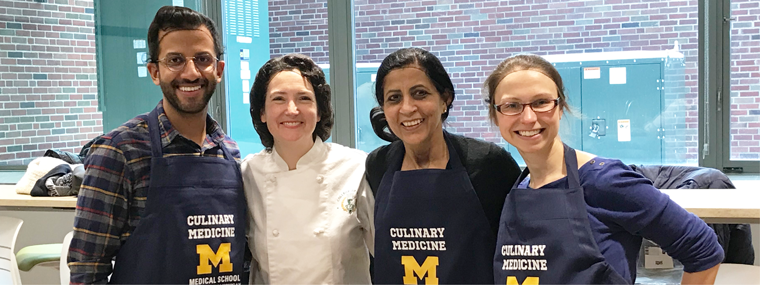
The new Culinary Medicine elective, piloted by the University of Michigan Medical School in February 2018, provides hands-on education and training to medical students, with the goal of providing them with increased knowledge and a better ability to make food recommendations to their patients. The course was initiated and codirected by Roma Gianchandani, MBBS, Associate Professor of Internal Medicine in the Metabolism, Endocrinology & Diabetes Division, and Brigid Gregg, MD, Assistant Professor of Pediatrics and Communicable Diseases in the Pediatric Endocrinology Division. Dr. Gregg also received a certification in basic pastry and culinary arts from the California Culinary Academy.
Dr. Gianchandani and Dr. Gregg tell us about the Culinary Medicine course and how it will benefit medical students.
How did the course come about?
Dr. Gregg and I had both separately connected with Tulane University about their culinary medicine curriculum. When the possibility of a kitchen being built at the East Ann Arbor Health Center came up, it seemed like the perfect time to bring a version of this course to U-M. The kitchen renovation ended up being delayed, unfortunately, but we decided to move forward with the course and we used the beautiful kitchen space at Eastern Michigan University. The efforts to bring this exciting curriculum to the medical school were supported by Carrie Braun, John Carethers, MD, MACP, Jill Cherry-Bukowiec, MD, Rajesh Mangulkar, MD, Ram Menon, MD, and Valerie Opipari, MD.
What does the course teach students?
The course combines The Goldring Center for Culinary Medicine at Tulane University culinary medicine curriculum with several strengths of Michigan Medicine. In addition to food and evidence-based nutrition knowledge, it will also teach students techniques for brief and effective nutritional interviewing, cooking skills assessment and counseling, and addressing food insecurity, under the leadership of Susan Aaronson, MA, RD, and other colleagues from the University of Michigan School of Public Health Department of Nutritional Sciences.
How many students were enrolled in this elective?
There were five students enrolled and a culinary intern in this elective. They represented a mix of graduating M4s (class of 2018) and rising M4s (class of 2019). In addition, there were two fellows from the Division of Metabolism, Endocrinology & Diabetes (MEND) who were involved in the course. This elective offered a unique opportunity for students from different classes to learn and work together.
How is the course taught?
The elective was two weeks long, consisting of both kitchen and classroom sessions. The course utilized an “inverted classroom” format. The students completed readings and quizzes for the kitchen sessions using Tulane University’s online resources. At the end of the kitchen session, the group sampled all of the food and discussed the qualities of the food that was prepared, followed by clinical cases that highlighted the nutritional and medication interventions that can be made in the specific clinical situations.
What meals were produced in the teaching sessions?
There were four kitchen sessions in which students were paired off and prepared two-three recipes based on the day’s module. Each pairing made different recipes, so at the end of each session there were six-eight dishes to sample. The four modules taught in the pilot were the Mediterranean Diet, Portion Control and Weight Management, the DASH Diet, and Carbohydrates. We were also excited to be able to include a “celebrity chef” kitchen session as part of the Portion Control and Weight Management module with Chef Jeff Bliven, former head chef of The Chop House Ann Arbor, who taught the students about the nutritional differences between home and restaurant cooking and many essential kitchen skills. We also prepared or sampled and evaluated dishes from other modules during the didactic classroom sessions.
What do you hope students learn from this elective?
Diet is a very important, modifiable risk factor that influences health and wellness. Our aim is that this course gives medical students the skills to talk about food to affect lifestyle and health behavior changes in their patients, through evidence-based recommendations, and to feel comfortable doing so. Physicians do not need to be trained to give detailed nutritional counseling, but can act as catalysts and plant the seeds for behavioral change. In addition, practical curricula in culinary medicine can improve not only the student’s ability to counsel patients about nutrition, but also their own nutrition habits and those of their family and friends. The personal health habits of medical providers can have a significant impact on their ability to counsel patients, bringing the objective of this course full circle.



